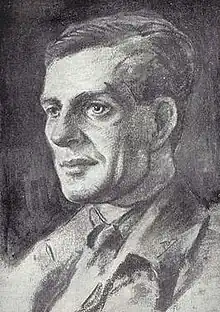Richard Herbert Howe | |
|---|---|
 | |
| Born | 21 June 1912 Arecife, Brazil |
| Died | c. 1 June 1981 (aged 68) Royal Tunbridge Wells, England |
| Allegiance | |
| Service/ | |
| Rank | Captain |
| Battles/wars | World War II |
| Awards | MBE Military Cross |
Captain Richard Herbert Howe MBE, MC (21 June 1912 – c. 1 June 1981) was a British army officer during World War II.[1][2] He was captured by the Germans in 1940 and eventually held in Oflag IV-C, at Colditz Castle, where he served as Escape Officer from 1942 to 1945.[1] He organised many escapes including eight successful home runs of British officers.[1]
Lt. Col. Moran of the Colditz Association described him as 'an outstanding chap, the soul of Colditz. In a crisis he was the most calm individual and he had enormous reserves of will power'.[3]
Life
Richard Herbert Howe was born on 21 June 1912 in Brazil, the son of Charles Herbert Howe and Ethyl Jeannie Maud Howe (née Nichols).[4] He was educated at Bedford Modern School between 1920 and 1930.[1][5]
Howe served as a lance corporal on the Officers' Training Corps at Bedford and was commissioned as a second lieutenant in the Royal Tank Corps on 13 May 1933.[6] After a short period of time with the Royal Tank Corps, he worked in radio manufacturing for Kolster-Brandes Limited, A.C. Cossor Limited and Truphonic Radio Limited.[7] At the outbreak of World War II he rejoined the 3rd Battalion Royal Tank Regiment.[7]
In 1940, Howe was serving in the British Expeditionary Force, as a lieutenant, and temporary captain, in the 3rd Royal Tank Regiment, when he was awarded the Military Cross while defending troops evacuating Calais.[1][8][9]
After being captured following the Siege of Calais, he was imprisoned at Oflag VII-C at Laufen. Howe was one of six British officers who escaped, but were eventually recaptured. Howe and the rest of the "Laufen Six" — Harry Elliott, Rupert Barry (later Sir Rupert Barry), Pat Reid, Anthony "Peter" Allan and Kenneth Lockwood — were then sent to Colditz.[10] Howe later replaced Reid as Escape Officer, co-ordinating all escape plans, after Reid himself escaped in October 1942. He organised many escapes including eight successful home runs of British officers.[1]
Howe remained a prisoner until the end of the war, but his efforts were recognized by being made a Member of the Order of the British Empire in June 1946.[11] Howe died in hospital in Tunbridge Wells, Kent in 1981.[1]
References
- 1 2 3 4 5 6 7 Obituary in The Times, Captain Richard Howe, 4 June 1981, p.16
- ↑ Obituary in The Daily Telegraph, Thursday, June 4, 1981, p. 16
- ↑ The Eagle, The Magazine of Bedford Modern School, Volume 40 (80), 1980–81, Number 291, p.324
- ↑ "Ancestry™ – Genealogy, Family Trees & Family History Records".
- ↑ "Bedford Modern School Memorials". Roll of Honour. 2010. Retrieved 28 September 2014.
- ↑ "No. 33939". The London Gazette. 12 May 1933. p. 3205.
- 1 2 Eggers, Reinhold (30 September 2014). Escape from Colditz. ISBN 9780719816345.
- ↑ "Recommendation for Award for Howe, Richard Herbert". The National Archives. 2014. Retrieved 28 September 2014.
- ↑ "No. 15725". The Edinburgh Gazette. 16 July 1940. pp. 447–449.
- ↑ "The Laufen Six". Pegasus Archive. 2006. Retrieved 28 September 2014.
- ↑ "No. 37595". The London Gazette (Supplement). 4 June 1946. p. 2736.